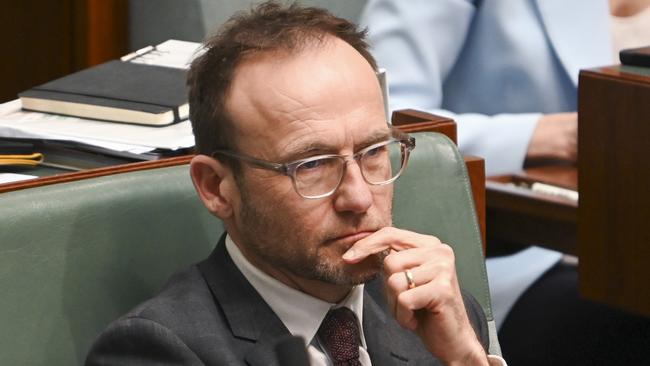Anthony Albanese secures Greens support for housing agenda
Anthony Albanese has secured the passage of his housing agenda in a significant pre-Christmas win, after staring down Greens demands.

Anthony Albanese has secured the passage of his housing agenda through the parliament in a significant pre-Christmas win, after staring down the Greens over demands that Labor budge on rent freezes and property tax concessions.
Greens leader Adam Bandt on Monday announced his party would back the Prime Minister’s $5.5bn Help to Buy scheme, assisting up to 40,000 first-home buyers enter the market, and Build to Rent program, which gives developers tax incentives to build apartments that can be rented out below the market rate.
The Greens won’t be handed any concessions for their support.
The minor party failed to force the government to negotiate on its housing platform amid poor election results at state and local council levels, but Mr Bandt said further assistance for renters and first-home buyers would now become an election issue.
“There comes a point where we pushed as hard as we can. We tried hard to get Labor to act on negative gearing and soaring rent increases, but we couldn’t get there this time,” he said. “We’ll wave through Labor’s housing bills when it comes to parliament, and we will push now at the election. We will take the fight up to keep Peter Dutton out and push Labor in minority parliament to act on those unfair tax handouts and soaring rent increases.”
The Australian understands Mr Albanese is adopting a ruthless approach to the legislative logjam this week and is prepared to jettison bills with no prospect of passing through parliament.
Senior government sources said MPs could be held back in Canberra on Friday if an additional sitting day is required to pass legislation.
Labor will also ask the Senate to extend Tuesday’s sitting hours in a bid to pass five more of its bills, including changing the indexation rate of Australians’ HELP debt, after legislating a new Aged Care Act on Monday.
Housing Minister Clare O’Neil, who took over the portfolio in July, accused the Greens of “playing politics on housing” for 2½ years as she welcomed the party’s support for the bills.
“Delay is costly,” Ms O’Neil said. “The net effect of the Greens in this term of parliament is to delay action on housing and cause greater pain to Australian who are in housing distress.”
Under Labor’s shared equity scheme a first-home buyer needs a minimum 2 per cent deposit to enter into a contract with the government, which will contribute up to 40 per cent of the property’s purchase price.
Build to Rent legislation would introduce tax incentives for developers to set aside 10 per cent of new homes for lease at 75 per cent the market rate of rent.
While the government’s social media ban on under 16s is also expected to pass this week with the Coalition’s support, Privacy Commissioner Carly Kind on Monday warned the proposed age verification requirement “may create some risks” because it would require the collection of additional personal information of all Australians.
But she said the privacy protections in the bill, which her office was “relatively happy with”, were stronger than existing provisions. “What the legislation in this instance says is that you cannot use it for a secondary purpose, subject to some exceptions, unless you have consent. This bill enshrines a much more robust definition of consent than exists already in the Privacy Act,” she told a three-hour Senate committee scrutinising the legislation.
ALP sources said a March election remained a “live option”, which would mean this week could be the final window to push through priority bills. Even if Mr Albanese runs full-term, there are only two Senate sitting weeks scheduled for February and three days slated during the March 25 budget week and still 75 government bills before the parliament.
Given market expectations the Reserve Bank will not lower the cash rate until August next year, there is a growing consensus inside Labor that there is little to gain from holding a May election or delivering a deficit-laden budget.
Under pressure to unveil the Coalition’s alternative manifesto, Peter Dutton is preparing to release key Coalition economic, energy, housing and other election policies before Christmas.
Marking the passage of the Aged Care Bill, Anika Wells assured elderly Australians whose contributions towards daily care will be increased under the laws through means testing that for every $1 paid as a co-contribution for support at home, the taxpayer would kick in $7.80.
While acknowledging concern from retirees over having to pay more during a cost-of-living crisis, Ms Wells said that without the reforms there would not be the capacity to care for them at all.
“There is still a very strong safety net that we have enshrined in the new Aged Care Act and very strong provisions for financial hardship,” she said. “A guiding principle is that people who can afford to pay to contribute more to the cost of their care should, but if you can’t afford to contribute more to the cost of your care, we’ve still got your back.”
Ms Wells also hosed down concerns from the Coalition and providers that the transition to the new aged-care system would be challenging and expensive.
ADDITIONAL REPORTING: SARAH ISON



To join the conversation, please log in. Don't have an account? Register
Join the conversation, you are commenting as Logout